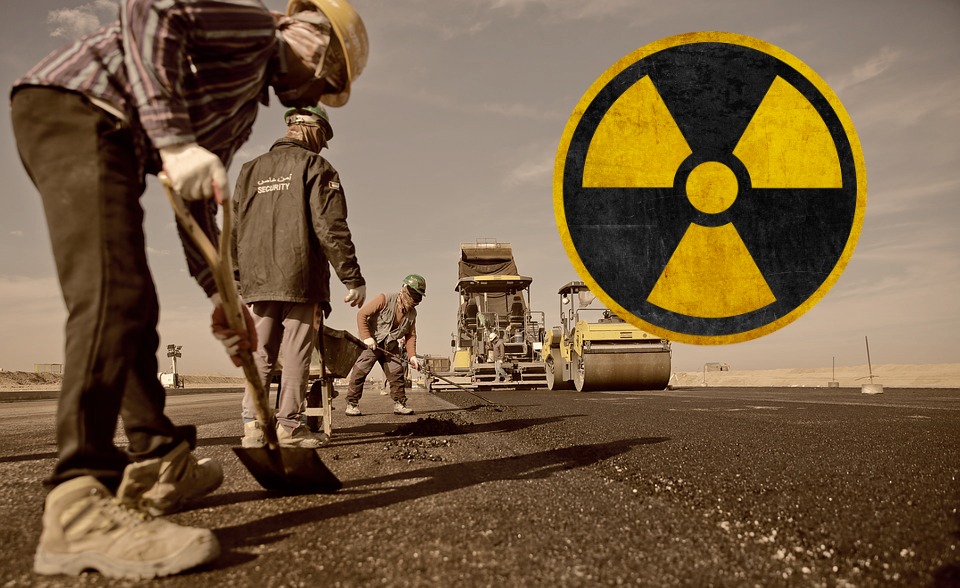 Brandon Turbeville
Brandon TurbevilleNatural Blaze
June 1, 2018
Toxic Oil and Gas Wastewater Used to Treat Roads Way More Toxic Than Previously Thought – Spills Into Waterways
Particularly in post Free Trade America, municipalities are facing some tough choices when it comes to deicing and suppressing dust on their roads. This is because a number of states are using oil and gas wastewater for these purposes. However, this raises a number of concerns both for the environment and for human health.
A new study published in Evironmental Science & Technology that analyzed regulations across the U.S. to determine whether or not such wastewaster can be used for road purposes found that 13 states permit its use while up to four other states may allow for the same under their “land spreading” regulations.
The fluid in question is that which is used in conventional oil and gas wells, not directionally drilled or hydraudically fracked wells.
At issue is the toxicity of the liquid with contains high concentrations of salt and potentially organic and radioactive materials. It also contains high amounts of calcium, magnesium, and strontium. Further contaminants include radium and other micropollutants. The liquid is known to stay on the road but, after subsequent rain, a portion of it runs off the highway into the earth or adjacent waterways.
"Oil and gas wastewaters are known to have high salt, organic and radioactivity concentrations," said Travis L. Tasker, graduate student in environmental engineering, Penn State. "When we found out that this wastewater was being spread on roads, we wanted to evaluate its potential to cause biological toxicity and accumulate in road material or migrate into water resources."
"We would like to do experiments to test how effective the wastewaters are at suppressing dust in comparison to other commercial products," said assistant professor of environmental engineering, Nathaniel R. Warner. "If the salts in the wastewaters are just as effective, then new regulations or additional treatment prior to spreading could help reduce the concentration of other contaminants of concern that exist in wastewaters, but not in commercial products."
"Radium is known to cause cancer, so we are concerned if it is spread on roads in high concentrations," said Penn State professor of environmental engineering, William D. Burgos.
The researchers collected samples of wastewater from townships in Pennsylvania that spread the liquids for deicing purposes and conducted simulated lab experiments to see where they contaminants ultimately end up. The discovered that the salts wash off the road in rain but some of the metal contaminants, such as lead, remain on the road. Some of the radium stays on the road, but some of it also washes off in the rain.
Obviously, radium and heavy metals are a problem but so is salt, since salt cannot be remove through simple waste water treatment mechanisms.
Still, the researchers suggest that, if oil and gas wastewater products are going to be used, they should at least be run through wastewater treatment facilities first, so the remove organic pollutants and radium first.
The problem is also that strapped municipalities cannot afford currently available alternatives and thus are faced with using the toxic substances or not deicing the roads. While the Federal government spends massive amounts of money propping up Israel and a host of other foreign governments, engaging in wars all across the world, and fighting drug wars, America’s infrastructure is crumbling. With states and municipalities also wasting money in prisons and fighting drug wars, they are simply not able to keep up with their actual responsibilities.
If Americans do not want to live in a toxic waste dump society with no essential services (but with plenty of prisons and enforcers) they had better speak up now and demand immediate change.
Please help us out by sharing!
This article (Toxic Oil and Gas Wastewater Used to Treat Roads Contains Radium) was created by and appeared first at Natural Blaze. It can be reshared with attribution but MUST include link to homepage, bio, intact links and this message. Get a nifty FREE eBook – Like at Facebook, Twitter and Instagram.

Brandon Turbeville – article archive here – is an author out of Florence, South Carolina. He is the author of six books, Codex Alimentarius — The End of Health Freedom, 7 Real Conspiracies,Five Sense Solutions and Dispatches From a Dissident, volume 1 and volume 2, The Road to Damascus: The Anglo-American Assault on Syria,and The Difference it Makes: 36 Reasons Why Hillary Clinton Should Never Be President. Turbeville has published over 1,000 articles dealing on a wide variety of subjects including health, economics, government corruption, and civil liberties. Brandon Turbeville’s podcast Truth on The Tracks can be found every Monday night 9 pm EST at UCYTV. He is available for radio and TV interviews. Please contact activistpost (at) gmail.com
No comments:
Post a Comment
Note: Only a member of this blog may post a comment.